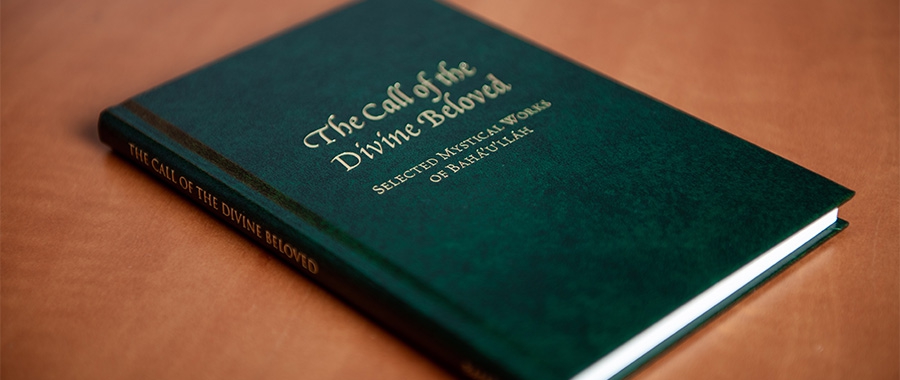A new volume of Baha’u’llah’s mystical works is now available online and in print.
The Call of the Divine Beloved has five newly published selections from Baha’u’llah’s writings, including a poem revealed during his time in the Black Pit of Tehran. The book also contains revised translations of two of Baha’u’llah’s well-known works, the Seven Valleys and the Four Valleys:
Praise be to God Who hath made being to come forth from nothingness; graven upon the tablet of man a measure of the mysteries of His eternity; taught him from the storehouse of divine utterance that which he knew not; made him a perspicuous book unto such as have believed and surrendered their souls; given him to behold, in this dark and ruinous age, a new creation within all things; and caused him to speak forth, from the midmost heart of eternity, and in a new and wondrous voice, embodied in the most excellent Temple. – Baha’u’llah, The Seven Valleys, newly revised translation, The Call of the Divine Beloved, online version.
For the first time, an authorized English translation of one of Baha’u’llah’s most renowned poetic works, Rashh-i-‘Ama, or The Clouds of the Realms Above, is made available. Perhaps the earliest fruit of Baha’u’llah’s pen, Rashh-i-‘Ama is one of the few writings he authored in his native land of Persia. The work, composed in 1852 during his four-month imprisonment in the Black Pit, is a poetic reflection on Baha’u’llah’s first intimations of his station as a prophet of God:
The day-star of adornment hath dawned forth above the face of God; Behold that mystic truth which from His Countenance is raining down.
The sea of purity hath from the wave of true reunion surged; This precious, rare bestowal from our rapture is raining down. – Baha’u’llah, “The Clouds of the Realms Above,” in The Call of the Divine Beloved, online version.
The remaining six of the publication’s seven works were revealed by Baha’u’llah during his time in Iraq, from 1853 to 1863. After being released from his cruel and unjust imprisonment in Tehran, Baha’u’llah and his family were banished to Baghdad in a perilous journey through the dead of winter. For three months they traversed the snowy mountains of Western Iran, inadequately equipped for the conditions and Baha’u’llah himself physically frail from his months of imprisonment in abhorrent conditions.
In Baghdad, a small and dejected band of Babis, whose leader The Bab had been executed by firing squad nearly three years earlier, had fallen into a state of disarray and disunity. Baha’u’llah withdrew himself from the turmoil of the community to the mountains of Kurdistan, where he lived a life of solitude, in near-constant prayer and meditation for two years—a period reminiscent of Moses’ withdrawal to Mount Sinai, Christ’s 40 days and nights in the wilderness, and Muhammad’s retreat to the cave on Mount Hira.
Assuming the identity of a dervish and clad in humble garb, Baha’u’llah was at first unknown to the people of the region. Stories soon spread of a man of extraordinary wisdom and eloquence found in the mountains. Numerous religious leaders and mystics were drawn to Baha’u’llah, often traveling long distances to visit him.
Two years after his withdrawal, Baha’u’llah, at Abdu’l-Baha’s request, returned to Baghdad, a moment Shoghi Effendi has described as “a turning point of the utmost significance in the history of the first Baha’i century.” Baha’u’llah’s return revived and animated the Babi community.
The subsequent period, Shoghi Effendi wrote, saw an “enormous expansion in the scope and volume of Baha’u’llah’s writings …” The Sufis and clerics who had come to revere Baha’u’llah while he was in the mountains of Kurdistan were now flocking to Baghdad to visit him. It was during those years when Baha’u’llah penned some of his most renowned works, including The Seven Valleys.
The Call of the Divine Beloved is available online here: the Baha’i Reference Library; and the book can be ordered through the United States Baha’i Publishing Trust.
















Comments
Sign in or create an account
Continue with Googleor